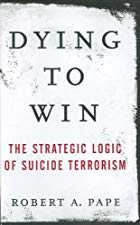What does the data tell us?

In 2005 Robert Pape (Dying to Win: The Strategic Logic of Suicide Terrorism) published figures that enable us to see whether al-Qaeda terrorists were influenced primarily by their religious beliefs or the foreign occupation forces in their countries.
(I earlier posted other findings of Pape’s identifying terrorist goals and targets: see Terrorist Facts, #2. The figures in this post identify the affiliations and origins of al-Qaeda terrorists.)
“Islamic fundamentalism” — an expression commonly referring to any Muslim movement that seeks to establish an Islamic state — is generally portrayed as “militant”. The fact, however, is that such movements are widely varied (with different movements not accepting each other as true Islamists) and “only a tiny fraction of those who subscribe to these movements have engaged in acts of violence.”
The Muslim world is broadly divided between Sunnis and Shias. The Shias are concentrated mostly in Iran and Iraq and no Al-Qaeda consisted of Muslims (it’s as good as dead now in 2013) who practiced a Sunni form of Islamic fundamentalism known as Salafism.
Apparently oblivious to the varied nature of Salafism (many Salafis oppose and condemn violence) a number of “important scholars and policymakers have . . . come to the conclusion that the ideology of Salafism is a principle cause of al-Qaeda terrorism.” (p. 107)
The following data is based upon the 71 al-Qaeda suicide terrorists who blew themselves up between 1995 and 2003. All but one of 67 whose nationality we know came from a Sunni Muslim country. The exception was from Lebanon and his religion is not known for certain.
An examination of the 66 al-Qaeda suicide terrorists who were known citizens of Sunni-majority countries shows that American military presence is a stronger factor than Salafi fundamentalism in predicting who dies for al-Qaeda’s cause. (p. 109)
| Country | Muslims | Salafi Influenced | Al-Qaeda Suicide
Terrorists
|
|---|---|---|---|
| Somalia | 10 | 5 | |
| Algeria | 31 | 19 | |
| Tunisia | 10 | 5 | 1 |
| Egypt | 62 | 23 | 2 |
| Sudan | 21 | 21 | |
| Nigeria | 68 | 37 | |
| Afghanistan | 25 | 10 | 3 |
| Pakistan | 149 | 43 | 2 |
| Bangladesh | 114 | 14 | |
| Indonesia | 185 | 26 | 3 |
| Yemen | 18 | 8 | 3 |
| Saudi Arabia | 21 | 18 | 34 |
| Jordan | 6 | 2 | |
| Oman | 2 | 2 | |
| Total | 722 | 233 | 48 |
i.e. . . .
1 Al-Qaeda terrorist per 5 million Salafi
1 Al-Qaeda terrorist per 15 million Muslims
| Country | Muslims | Salafi Influenced | Al-Qaeda Suicide
Terrorists
|
|---|---|---|---|
| Morocco | 28 | 12 | |
| Mauritania | 3 | ||
| Senegal | 9 | ||
| Mali | 10 | ||
| Guinea | 5 | ||
| Sierra Leone | 3 | ||
| Chad | 4 | ||
| Burkina Faso | 6 | ||
| Mauritania | 3 | ||
| Malaysia | 13 | ||
| Uzbekistan | 21 | ||
| Turkmenistan | 5 | ||
| Kyrgzstan | 3 | ||
| Turkey | 67 | 4 | |
| UAE | 2 | 2 | |
| Kuwait | 2 | ||
| Syria | 15 | ||
| Albania | 2 | ||
| Niger | 7 | ||
| Total | 212 | 18 |
i.e. . . .
1 Al-Qaeda terrorist per 12 million Muslims
Comparing the relative frequency of al-Qaeda suicide terrorists in these two groups of countries, al-Qaeda suicide terrorists are twice as likely to come from Salafi-influenced populations as from Sunni Muslims in other countries.
However, when we examine the effect of the absolute number of the Salafi-influenced population on the absolute number or terrorists from any country, the effect is not statistically significant . . . . Pakistan produced far fewer terrorists and Saudi Arabia and Morocco far more than would be consistent with a direct relationship between Salafism and suicide terrorism. . .
This means that . . . the odds that someone from a Salafi-influenced country will become an al-Qaeda suicide terrorist are not significantly better than chance. (pp. 110-112)
Contrast the data that relates al-Qaeda suicide terrorists with American combat operations. But first, what is meant by “Occupation”?



